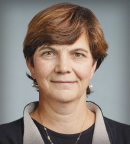Internationally renowned for her decades-long pioneering research in pancreatic cancer, in 2024, Diane M. Simeone, MD, left her positions as the Laura and Isaac Perlmutter Professor of Surgery and Pathology; Director, Pancreatic Cancer Center; and Associate Director of the Perlmutter Cancer Center at New York University Langone Health in New York, and headed to San Diego, to serve as Director of the Moores Cancer Center at University of California (UC) San Diego Health and the Chugai Endowed Pharmaceutical Chair of Cancer and Professor of Surgery and Pharmacology at UC San Diego.
Dr. Simeone is also the founder, principal investigator, and Executive Committee Chair of the Pancreatic Cancer Early Detection (PRECEDE) Consortium (https://precedestudy.org), which aims to increase the 5-year survival rate for all stages of the disease from 13% to 50% within the next 10 years. The PRECEDE Consortium, launched in 2020, is an observational, longitudinal, prospective cohort study (ClinicalTrial.gov identifier NCT04970056) of individuals at an elevated risk of developing pancreatic cancer based on heritable factors or the presence of a cystic tumor. Study participation includes serial biospecimen sample collection every 6 to 12 months and acquisition of standardized clinical and imaging data in defined individuals.

“Today, there is so much corporatization of health care that I feel like we’re losing the interaction between patient and physician.”— DIANE M. SIMEONE, MD
Tweet this quote
With the goal of driving research for the early detection and prevention of pancreatic ductal adenocarcinoma, the clinical trial is enrolling individuals with a family history of pancreatic cancer and/or individuals carrying pathogenic or likely pathogenic germline variants in genes linked to development of the cancer. Since the study launched, it has enrolled nearly 9,000 participants at 60 sites worldwide and plans to enroll 10,000 participants in the 10-year study.
The ASCO Post met with Dr. Simeone shortly after she was named Director of Moores Cancer Center. In this interview, she discussed her career change, her continuing role in the PRECEDE Consortium, and the importance of institutions working together to improve cancer care for patients.
Helping to Guide Clinical and Scientific Innovation
Please talk about why you decided to make the move to San Diego and take the position of Director of Moores Cancer Center.
One main reason is because I wanted to have the opportunity to help guide clinical and scientific innovation, increase access to early therapeutics through clinical trials, train the next generation of clinicians and researchers, and organize multidisciplinary care teams to give patients the best coordinated clinical care. We want to learn from every patient we see, so we can continue to improve treatment protocols and increase survival outcomes. I just want us to collectively do a better job of treating cancer, especially difficult cancers such as pancreatic cancer, and to make it more affordable for patients to receive care.
One interesting issue that came out of the PRECEDE trial is there are regions across the country where patients cannot get cancer screenings, because they are either not covered by insurance or the insurance copay is too high. We have established cancer screening guidelines in the United States, and people should be able to access that screening without having to worry about whether they can afford that care. We can prevent cancers or pick them up at very early stages, when they are most curable, and we’re not doing such a good job of that because of our fractured health-care system, which is difficult for patients to navigate, and the cost of health care.

Today, there is so much corporatization of health care that I feel like we’re losing the interaction between patient and physician. At Moores Cancer Center, physicians are valued, and their concerns are listened to and acted upon, so it’s a good environment to bring the best science and cancer care to our community. Here, the number-one priority is the patient and not the bottom line. I was seeking to be in an environment with this kind of focus and found it at UC San Diego.
In my capacity as Director of Moores Cancer Center, part of my responsibilities is to coordinate all research and clinical activities, which is so important to make the whole enterprise much more efficient and effective to drive the continuum between scientific discovery and clinical care. What I love about being here is that the center is embedded in a highly collaborative community in which everyone is pulling together in a common goal to have a positive impact on patients.
There are also several other leading scientific research institutes in the area, including the La Jolla Institute for Immunology, a world-renowned institute for immunologic studies; and San Diego State University, which is a top institution for the study of public health and population sciences. Moores Cancer Center is one of only a few Consortium Cancer Centers in the United States in which multiple institutions join together in their cancer efforts. We also have a partnership called C3 with the Salk Institute for Biological Studies and Sanford Burnham Prebys Medical Discovery Institute to share research cores. I am thrilled to be embedded in this highly collaborative environment where innovation is front and center.
Creating a Vision for the Early Detection of Pancreatic Cancer
How does your new position affect your role in the PRECEDE Consortium?
The launch of the PRECEDE Consortium was never meant to be relegated to one institution or one investigator. It doesn’t belong to any one center or person; the PRECEDE Consortium and the accompanying PRECEDE study actually belong to all the participating centers, the investigators, and study participants worldwide. Currently, we have more than 60 centers engaged and another 40 in various stages of joining the study.
To change survival outcomes in pancreatic cancer will require a worldwide effort. I continue to be amazed every day by how many centers want to join the study and how much patients support this effort. It is not through one center, but a highly coordinated, large-scale collaborative effort that will allow us to detect pancreatic cancer at earlier stages and to better understand who is at risk for developing this disease.
“The launch of the PRECEDE Consortium was never meant to be relegated to one institution or one investigator.”— DIANE M. SIMEONE, MD
Tweet this quote
We know based on Surveillance, Epidemiology, and End Results (SEER) data that if you find a stage Ia pancreatic cancer (< 2 cm), the survival rate is 83%. That needs to be the goal. And there’s no reason why we shouldn’t be able to find cancers < 1 cm, which would be game-changing in this disease. This large-scale effort brings new strategies and partners to the table in a whole new kind of way.
With PRECEDE, my goal was always to try to create a vision of where we could go in the early detection of pancreatic cancer, extend life expectancy, and provide an overall strategy for how to get there. I’m still involved in the study, just not in its day-to-day operation, and I’m committed to ensuring that we bring these goals to the finish line.
Creating Leadership Career Paths for Minority Clinicians
A recent study of the demographics of the cancer research workforce in the United States found that just 14% of cancer center directors are women,1 so you are in a very exclusive club. Do you feel you have a responsibility to help prepare other underrepresented clinicians and researchers for leadership roles in both community and academic cancer centers?
I do feel that part of my job is to try to create paths for others to rise to leadership positions within their institutions and to make sure there is equal opportunity for talented people from all backgrounds to mature into leadership roles. We need to bring all the talent to the table to ensure that patients and their families have access to the very best cancer care, including early detection.
We should move past an environment in which everyone is competing against each other and put in place instead a best practices framework to enable us to function as a network. We can accomplish much more if we all work together.
DISCLOSURE: Dr. Simeone is a member of the scientific advisory board of the PRECEDE Foundation, Pancreatic Cancer Action Network, Longevity Life, Eckuity Advisors, TME Therapeutics, and Toray America.
REFERENCE

